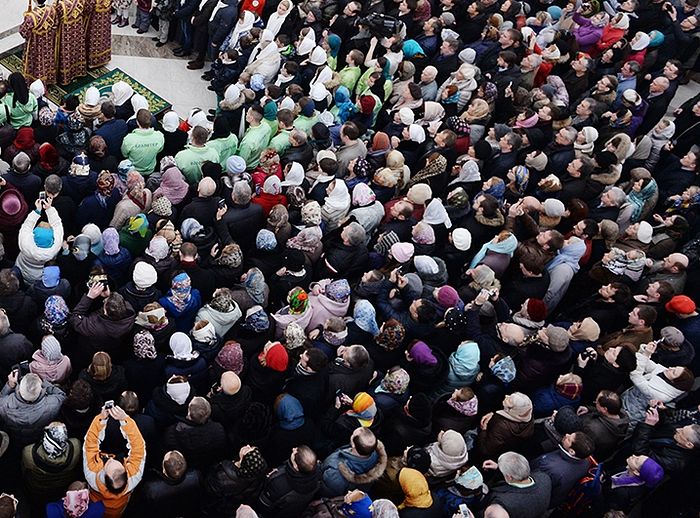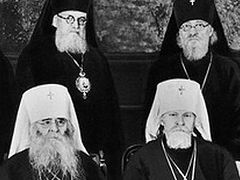I was strolling through Moscow once on a Lenten evening. There were a lot of people in the churches. This warmed my heart. And although the forty times forty churches were largely lost under the Bolsheviks (even twenty times twenty sounds fantastic), thank God, there are many churches within the Garden Ring. And I repeat, these churches are not empty, and that’s putting it mildly. The smaller ones are even chock full. More and more people come to the churches. People of both sexes and all ages come. They whisper something of their own and repeat something learned by heart from a prayer book. They follow the service, bringing their requests, or, in general, repent of their sins. It’s their business—theirs and God’s. He hearkens to their whispers and thoughts, and He answers. If He didn’t answer they wouldn’t come. That’s something that just occurred to me.
Indeed, no one beats us for prayer, and no one cheers us on. No one beats, I repeat, or cheers us on. Both one and the other have happened in history, and we will briefly speak about that. Today our churches are filled exclusively with those who have come to God themselves. Themselves! Neither from fear, nor for perks. Usually they’ve been taught nothing, feeling their way along to the Source of Life. Themselves! By intuition. We must appreciate this.
There was a time when all sorts of activists and Komsomol members recorded those entering the Church; this is known. Perhaps some have partially forgotten, or some know absolutely nothing about these times, but it must be known. It must! There were times when they crucified priests on the Royal Doors, and “communed” them with molten tin, when they gouged out their eyes “for Christ,” or simply hung them out of satanic wickedness… This all happened. Then it was a little lighter, but not kinder. We must remember those times when it was fearful just to enter a church. They weren’t hanging anyone, but… They weren’t slamming their fingers in doors, but… But careers, problems at work, housing lines, a little of this, a little of that… You’re a believer? Come to church tomorrow. And tomorrow would stretch into a decade. They would get married at night, baptize their children in secret, confess while on vacation in the South where nobody knows them. This all happened, and it’s a sin to forget it. And now we have none of that, and thank God for it! Go to church—no one will hit you. No one will take your name down for denunciation to the authorities, and no one will be kicked out of college. And are we thankful to God for our times when it’s possible to be baptized without fear, when we can get married openly, and fearlessly remove your cap around a church? Are we grateful?
But there is a second extreme, when it’s “profitable” to believe. Just imagine getting paid extra for going to church: at work it’s a common thing to get paid more. They say: whoever is a believer in Christ gets paid extra in such and such an amount. Or they increase students’ scholarships, or, maybe they add points to tests for “faith.” And legally so. For the sake of Christ. Imagine—it’s a nightmare! Just imagine—a person is compelled by incentives to believe in something that he doesn’t believe in in his heart. It’s a real horror, and there’s no other horror that can be compared with it! And thank God we don’t have this either.
We mustn’t give Orthodox Christians absolute power. In the case of absolute power, we torment the whole world with our “cans” and “cannots” and arouse terrible hatred towards ourselves, which no one can cope with. It’s not for us to build the world on the ground, but to vivify it with meaning, and honesty, and an ascetical spirit. We are to vivify the world, not to govern the world. One of the ancient apologists wrote that Christians themselves vivify the world, as a soul, not violently ruling the world. In ruling the world, we quickly cease being Christians. The mayor in Gogol said to one of his counterparts: “At least I’m solid in the faith!” That is, I go to church, and I’ve never seen you in church. They are both thieves, but one of them boasts in his Orthodoxy. Is such an Orthodoxy as the mayor’s to our liking? Obviously not. And if we were paid for prayer, then the churches would be filled with a crowd of other people coming just for the sake of money, and not for the sake of Jesus. I am grateful to God that no one pays us for going to church. I’m also grateful to God that no one beats anyone in the face (for now) as they enter a church. Both are good.
Chase us out! We won’t disappear! True, we may be reduced to a miniscule number, which would be heartbreaking, but within this number will remain a few George the Trophy-Bearers, who, by definition are few. But where will the rest of the people go? Those who differ in no way from “A” to “Z” and understand nothing of dogma, but believe only by the feeling in their hearts—where will they go? There are millions of them! But if you (the imaginary “you”) want to gather mankind en masse into Orthodoxy, then know that it’s a phantom. It’s a criminal illusion. Those who became Orthodox “for the company” will hand us over at the first convenient opportunity.
We do not need quantity, but quality. From quality will come quantity. It’s not going anywhere. However, there will be only failures from a historical perspective due to the empty quantity. But I’m genuinely glad that no one beats me (you, him, and them) for going to church. But I’m also glad that no one pays me extra to go to church and pray, or gives me any preferences in the communal apartment, or boosts my tests scores. If this happened, I would first want to rebel against dragging idle bystanders into the Church by the promise of earthly privileges—not even blessings, but just benefits. So, friends and foes, our times, in my humble opinion, are the best times. They don’t pay us for Orthodoxy, but they don’t knock our teeth out for it either. What more could we want? After all, the churches are full—full with those who are not threatened for praying in a holy place, and, at the same time, who have nothing to gain from it. Is this not grace? Truly it is the best of times.




